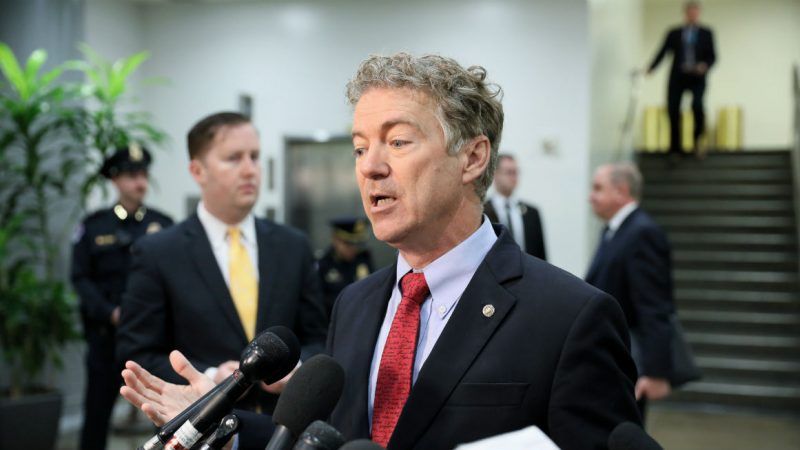Trump's Venezuela Escalation Could Destroy MAGA, Warns Rand Paul
Blowing up boats won’t stop drugs—but it could sink Trump.

Since September, President Donald Trump has ordered 21 strikes on boats in the Caribbean and Pacific oceans, killing 83 people. He says the boats were carrying dangerous narcotics to the United States (a claim that has been disproved). Now, the president appears to be ramping up his military escalation against Venezuela's socialist regime, which, like the drug boat strikes, he's doing without congressional authorization. Republicans in Congress have thus far been silent about Trump's use of force, except for Sen. Rand Paul (R–Ky.), who delivered a fiery rebuke of the president's strikes on the Senate floor last month.
During a recent interview with Reason's Nick Gillespie, Paul pointed out that "when the coast guard boards vessels off of Miami or off of San Diego, one in four vessels they board does not have drugs on board, so their error rate is about 25 percent." The moral and strategic implications of this hit rate are enormous; if the president can incinerate unknown civilians at sea without evidence of wrongdoing, due process, or congressional approval, what's to stop the president from using the military to sanction other murders abroad under the guise of national security?
These strikes, as well as Trump's other actions against Venezuela and involvement in the Ukraine war, also have political implications, according to Paul. "If he invades Venezuela, or if he approves significant arms sales, which are really gifts to Ukraine, or more welfare to Ukraine, if he does either of those, the rift with Marjorie Green will pale in comparison to what happens to his movement," Paul said. "If he invades Venezuela or gives more money to Ukraine, his movement will dissolve."
Sen. @RandPaul has a foreign policy warning for Donald Trump: "If he invades Venezuela or gives more money to Ukraine, his movement will dissolve," he says on The Reason Interview podcast with @nickgillespie. pic.twitter.com/QwqEi17wtL
— reason (@reason) November 20, 2025
Trump's MAGA base has been in flux in recent weeks. Rep. Marjorie Taylor Green (R–Ga.), who was once one of the president's strongest supporters, has become one of his loudest critics. In October, she came out against Trump's immigration and trade policies and has since been a regular thorn in the side of the administration. Her antics have led Trump to pull his support from her reelection campaign. Sen. Ted Cruz (R–Texas), meanwhile, has begun to lay the groundwork for a 2028 presidential run by distancing himself from Trump-aligned firebrands like Tucker Carlson and Vice President J.D. Vance.
These defections serve as a vivid example of how fractured the MAGA coalition has become. With many of its core voters despising neoconservative foreign policy and believing Trump's 2016 message that America should stop policing the world, a U.S. conflict in Venezuela would make the already-bad MAGA blowup even worse. It would also combine all the worst elements of past failures: shaky intelligence, freelance presidential action, and a war of choice with no clear American interest.
Paul's warning is blunt: a Venezuela intervention wouldn't just be disastrous abroad—it could politically detonate the MAGA movement itself. For a president who ran on ending "the forever wars," starting a new one remains the fastest way to break the coalition that got him elected.


Show Comments (82)